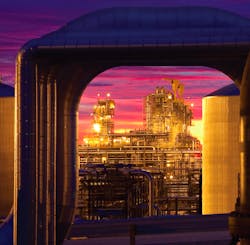When ExxonMobil Chemical got a new operating system in mid-2001, it brought with it everything from excitement to anxiety; the promise of new possibilities to the fear of the unknown. And then there’s what came after…
The specialty chemical manufacturer had some idea of what it was getting into when it switched to Emerson Process Management’s distributed control system (DCS). “We had an understanding of what DeltaV could bring to the party,” explained David DeBari, senior process engineer at ExxonMobil Chemical, adding that the company went through operator training for the new system as well. “But we realized after we started that there really is an advanced DCS component, and that’s what comes after you start up.”
While most projects include operator training, often the missing component is the advanced DCS training, DeBari said. That advanced training DeBari calls Top Gun for Operators. “If you want to be the best, you learn this stuff,” he said.
DeBari, who detailed his training efforts during the Emerson Global Users Exchange in Grapevine, Texas, last week, identified the criteria he used to develop training:
- What are the main details that cause problems, upsets, inefficiencies, shutdowns, losses?
- What items are operators asking for more information about?
- What areas are management hot topics or areas for improvement?
- Who are the experts on these processes?
- What is a good model or representation?
- Include DCS and non-DCS items as appropriate.
- This is an evergreen set of materials and will change over time, so updates are necessary.
Rather than sit operators down in a room for eight hours of lecture, ExxonMobil Chemical opted to train its operators in quick burst—just two sessions of 15 minutes each. Training focused quickly on a system overview, basic operation controls, advanced operation controls, and typical problems—things to watch for, and also how to recover from them.
Although these might sound like relatively basic topics, it’s not just the young and inexperienced folks who need the training. “Almost everybody needs this training because you just changed the system,” DeBari said. “Even your most experienced engineers, because you just ripped the rug out from underneath them.”
It’s also not just the operators who need the training, DeBari said, noting that training is important for engineers as well. “We didn’t change the process. We changed the way it looks on the screen, and a little bit how they’re connected together,” he said. “Your engineers need to understand that as well.”
ExxonMobil Chemical didn’t hit its operators with additional training right after the new DCS was in place. Since they’d had some training before getting the new system, they needed some time with the new system first, DeBari contends. “After their experience level dropped off, and they felt comfortable with it—that’s when you do your training,” he says.
The first round of advanced training was completed in January this year, and ExxonMobil Chemical has introduced one new topic about every two months since. Not only have operators been observed actually using the training materials at their consoles, there were reports of immediate improvement in their understanding of the system. The chemical manufacturer reported a 90% reduction in downtime for problems related to the first area of training, and has seen similar results with subsequent training topics. There has been a massive reduction in DCS-related downtime, DeBari said.
DeBari has also looked into ways to incentivize operators to want to continue to improve their skills. One way was to get operators certification for their hard work, part of the idea being that those operators with increased skill might get increased pay to go with it. “If you get certified as a master operator, you ought to earn more,” he said.
About the Author
Aaron Hand
Editor-in-Chief, ProFood World

Leaders relevant to this article:
